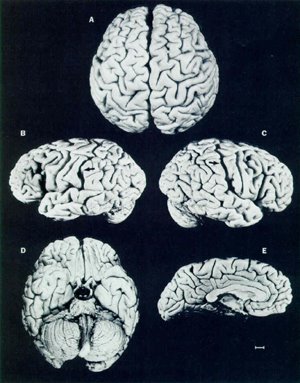*Singularities can also be divided according to whether they are covered by an event horizon or not (naked singularities). According to general relativity, the initial state of the universe at the beginning of the Big Bang, was a singularity-a tiny point of infinite density where the laws of physics break down.
The equations of general relativity tells us that at the moment of the big bang, everything in the universe would have been infinitely squeezed together and the universe would have been compressed into a single point (the singularity).
Other types of singularities predicted by general relativity are found inside a black hole: any star collapsing beyond a certain point would form a black hole, inside which a singularity (covered by an event horizon) would be formed.
The Penrose-Hawking singularity theorems are a set of results in general relativity which attempt to answer the question of when gravitation produces singularities. A singularity in solutions of general relativity is one of two things:
a situation where matter is forced to be compressed to a point (a space-like singularity)
a situation where certain light rays come from a region with infinite curvature (time-like singularity)
Now, I ask, why do we remember the past instead of the future?
You see, the second law of thermodynamics says that if we currently have a low entropy system (a measure of the disorder of a system/chaos and specifically in thermodynamics, a measure of the disorder of molecules in a system), we can expect to have a high entropy system in the future. The law tells us that as you go back in time, things get less and less random (i.e. a glass falling off a table would break into millions of pieces (more random/disorder) but rewind and all the pieces would come together to form the one glass (less disorder/chaos)... Entropy is the only quantity in the physical sciences that seems to imply a particular direction for time.
Does the origin of the thermodynamic arrow of time lie in the nature of the big bang? Does consciousness have its weird hand in our perception of time beginning in the past, passing through the present, and then moving forward into the future? As we go "forward" in time, the second law of thermodynamics tells us that the entropy of an isolated system tends to increase or remain the same; it will not decrease. Thus one could, theoretically, consider entropy measurement as a kind of clock.
Is there a connection between the thermodynamic arrow of time and the psychological arrow? For it seems to be that memory and our capability of such is intimately connected to the arrow of time. Considering braincells as computer bits and its correlation to the outside world as that of memory, the law explains the growth of such correlations with time a forward movement, propelling toward the future, rather than the past (entropy growing as time passes).
However, this is not the only option.

There are peoples, like the Aymara, who associate that which is ahead as past and that which rests behind, the future...dope.
The Moving Finger writes; and, having writ,
Moves on: nor all thy Piety nor Wit
Shall lure it back to cancel half a Line,
Nor all thy Tears wash out a Word of it.
- Omar Khayyám


.jpg)
No comments:
Post a Comment